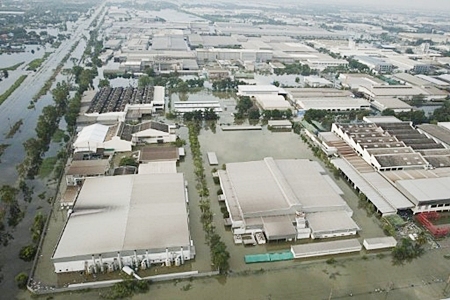BANGKOK, Feb 3 – The Bank of Thailand (BoT) on Friday cut the country’s 2011 economic growth to just one per cent from the earlier projected 4.1 per cent thanks to the heavy blow of the flood crisis last year, but the economy is expected to grow 4.9 per cent this year and 5.6 per cent in 2013.
Paiboon Kittisrikangwan, BoT assistant governor said the impact of severe flooding on the country’s economy amounted a loss of 3.1 per cent of gross domestic product (GDP) or about Bt340 billion in damages. GDP in the fourth quarter of 2011 shrank 7.4 per cent, compared to the third quarter, with the blow to Thai economy was more severe than that of the 2008 US sub-prime crisis and the Tom Yum Kung crisis in 1997 as flooding heavily affected the industrial sector.

Damage at the industrial estates caused severe supply chain disruptions and overall rehabilitation needs a long time to complete due to insurance claim processes and the need to purchase new machines for those plants.
The Thai economy this year is in a period of recovering from the flood in 2011, Mr Paiboon said.
It is expected that the Thai economy will return to normal in the third quarter of this year and that the overall economic recovery will be supported in part by spending on flood rehabilitation.
Investor confidence has improved as well as private consumption. The government’s Bt400 billion deficit budget will help stimulate the economy.
In Fiscal 2012, beginning with a three-year water management project valued at Bt350 billion and investment in state enterprises will help boost the Thai economy to grow 4.9 per cent from 4.8 per cent.
The Thai economy in 2013 is likely to expand at a normal rate because the manufacture sector will return to normal, and the world economy is likely to rebound and favour Thai exports. The government’s budget deficit will support the Thai economy to grow 5.6 per cent, he said.
Mr Paiboon warned that risk factors for the Thai economy are the European debt crisis, which can affect the economies and financial markets of other countries, particularly their export sectors. Thai exports in 2012 were projected to grow 7.8 per cent. Domestic factors such as the government’s policy on water management to create confidence among investors must be closely monitored.
Inflationary pressure eased in line with consumer goods prices and demand, which slowed down along with the world economy. Core inflation was projected to drop to 3.2 per cent in 2012 and 2.9 per cent in 2013 while headline inflation in 2012 is likely to fall to 2.2 per cent and 1.7 per cent in 2013.




